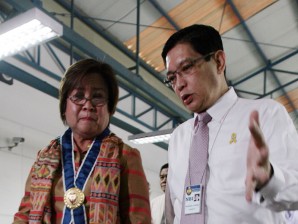No kidnap, just arbitrary detention—Gatdula lawyers
It was no kidnapping but simply a case of “arbitrary detention.”
Lawyers of dismissed National Bureau of Investigation Director Magtanggol Gatdula pointed this out to justice department officials who recommended the filing of kidnapping charges against their client that became the basis for his dismissal by President Aquino.
“You cannot accuse a public official of kidnapping. You can only file a kidnapping case against a private individual. Those involved here are public officials. Did you (DOJ) commit a mistake on that one?” said Nancy Ocampo, one of the lawyers defending Gatdula.
Gatdula’s lawyers are seeking to have the two department orders issued by the Department of Justice (DOJ) on the alleged abduction of Japanese Noriyo Ohara declared unconstitutional and therefore “null and void.”
This will mean that all evidence obtained by the DOJ fact-finding panel would be inadmissible in any court proceeding.
Article continues after this advertisement“Imagine, they are accusing a public official of kidnapping without a complainant,” said another of Gatdula’s lawyers, Abraham Espejo.
Article continues after this advertisement“There is already a determination of guilt even before he can defend himself. The DOJ has prejudged him,” Espejo said.
Ocampo said their client was not allowed to have a lawyer when he was invited to appear before the fact-finding panel.
“He was not even given a copy of the department order on the formation of the fact-finding panel. He has a right to be informed of his rights,” Ocampo said.
Gatdula also did not know when he appeared before the panel that he was one of the respondents, they said.
“The moro-moro (make-believe) kidnapping investigation commenced under the guise of an administrative inquiry … this was malicious and deceitful,” he said.
The lawyers noted that no complaint has been filed by Ohara or her foster family in the Philippines against Gatdula.
According to Espejo, they have been getting reports from their sources at the DOJ that some officials were coercing Ohara to sign a complaint. With Philip C. Tubeza
